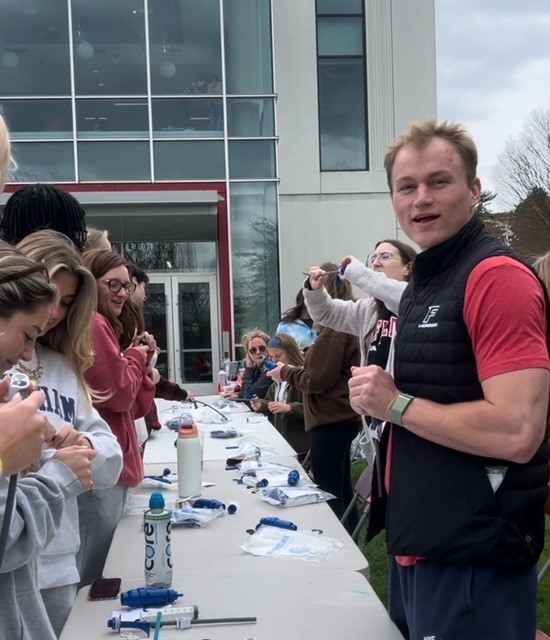
FAIRFIELD, Conn. — For a group of Fairfield University students, turning a faucet and having immediate access to clean, potable water is not something to be taken for granted.
These undergraduates are part of the Center for Social Impact’s Humanitarian Action Club and for the past four years they have worked with the nonprofit organization Wine to Water to raise money to purchase and assemble water filtration kits at an annual water filter build as part of campus Earth Day celebrations in April.
Working with the Wine to Water nonprofit has instilled in these students an appreciation for the transformative power of clean water—not only its ability to save lives and uphold human dignity but also the far-reaching implications for communities in the U.S. and around the world. From fostering environmental sustainability to improving healthcare and driving economic growth, clean water serves as the foundation for countless opportunities and advancements.
Recent Fairfield graduate Evan Keiser ’24 was a first-year student when he pitched the idea of partnering with Wine to Water at a meeting of the Humanitarian Action Club. He had volunteered for the nonprofit during his high school years at Bellarmine College Preparatory in San Jose, California. During his four years at Fairfield, he and his fellow club members raised more than $20,000 and assembled over 350 water filters – each of which can provide a family with clean water for up to ten years.
Although Keiser has graduated, the Humanitarian Action Club’s work to bring potable water to communities around the world continues. “The annual filter build is an opportunity to bring the Fairfield community together in a meaningful way as we work on a cause whose reach extends beyond our school and supports communities worldwide,” said Grace Lanigan ’25, a Center for Social Impact fellow.
Just last year, nearly a third of the 90 water filtration kits built by Fairfield students were deployed to towns including Boone and Asheville in North Carolina as part of Wine to Water’s disaster response efforts in the wake of Hurricane Helene. Others will be sent to places such as Nepal, Tanzania, and the Dominican Republic.
Raising funds for water filtration kits begins on campus each year with a Holiday Filter Drive and continues through late winter with raffles, Valentine-grams, and club members’ social media campaigns. A single filter costs $60; the club’s goal this year is to raise $5,000.
This year’s Earth Day celebration and water filter build is scheduled for Sunday, April 27, 2025 in the apple orchard beside the Barone Campus Center, from 1 to 3 p.m. Between 40 to 50 students are expected to participate alongside faculty and staff members. Center for Social Impact Fellow Carl Meiser ’25 is looking forward to once again joining the celebration. “The world is made of people and as our temperatures rise and water security becomes more important, the mission of Wine to Water and the education that the filter build gives to students becomes more essential,” he said. “Climate change will continue to drive global water insecurity; the mission of Wine to Water aims to aid those affected.”
Fairfield University is a modern, Jesuit Catholic University, rooted in one of the world’s oldest intellectual and spiritual traditions. More than 6,000 undergraduate and graduate students from 44 states, including the District of Columbia and Puerto Rico, and 43 countries, are enrolled in the University’s five schools. In the spirit of rigorous and sympathetic inquiry into all dimensions of human experience, Fairfield welcomes students from diverse backgrounds to share ideas and engage in open conversations. The University is located in the heart of a region where the future takes shape, on a stunning campus on the Connecticut coast just an hour from New York City.